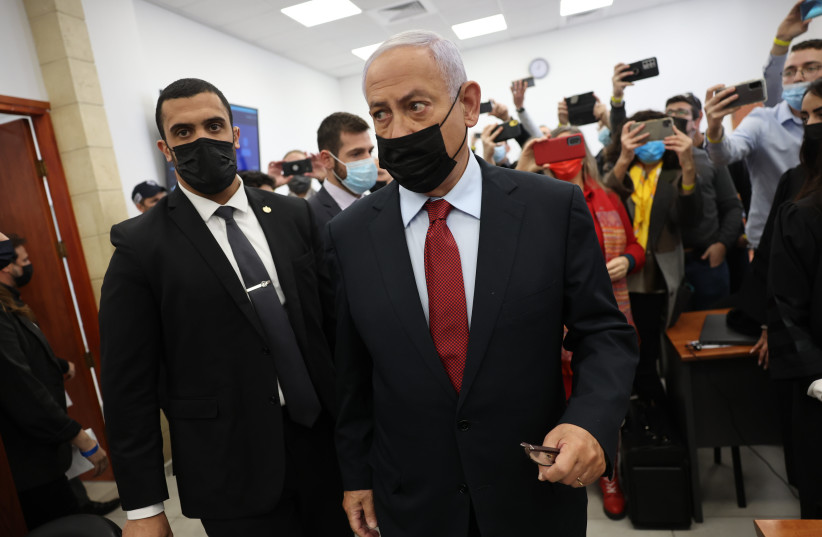Tuesday’s hearing before the Jerusalem District Court in the public corruption trial of former prime minister Benjamin Netanyahu was explosive. But will it lead to a reduction of the most serious charge of bribery in Case 4000 to a mere breach-of-trust charge? And if the court ultimately makes this reduction, could Netanyahu be convicted of the minor crime of breach of trust while still keeping his political career alive – something that would have been doubtful if he was convicted of the more serious bribery charge?
The arguments for and against
On one side, the court rejected the prosecution’s request to amend its indictment.
The prosecution was hoping to use the cleanest possible way to eliminate a major error it made regarding the date of a key meeting that is part of the media bribery narrative at the heart of Case 4000, the Bezeq-Walla Affair.
In addition, the court’s criticism of the prosecution regarding this factual error was extremely harsh.

At the same time, the court went out of its way to cite Section 184 of the Israeli Criminal Law, which allows the court to convict a defendant based on facts that go beyond what was contained in the indictment.
What does it all mean?
There are two ways to read the court’s rejection of the prosecution’s request to amend the indictment.
Netanyahu hopes that the harsh language the court used for the prosecution was a foreshadowing of it dropping the bribery charge entirely, and either fully acquitting him or convicting him only of the reduced minor charge of breach of trust.
The prosecution hopes that the court’s inclusion of Section 184 was a hint that as long as the prosecution convinces the court that the key mid-2015 meeting between Netanyahu and his former top political aide Shlomo Filber, who turned state’s witness, did in fact happen, the court will be ready to still convict Netanyahu of bribery.
This would be in spite of the prosecution messing up on the proper date of the key meeting in question.
Another major issue that came up on Tuesday was Netanyahu’s phone conversation with Filber in March 2016.
According to the prosecution, this phone conversation was a rebuke by Netanyahu for Filber not being aggressive and fast enough in carrying out aspects of the media scheme desired by Bezeq.
However, during Filber’s testimony on Tuesday, the defense lawyers appeared to elicit from him that it was possible that this phone conversation with Netanyahu was a rebuke by the former prime minister for allowing the media to inaccurately suggest that Netanyahu was favoring Bezeq and aspects of government policy.
In fact, the public does not have a handle on what the court knows, which is that there were three major conversations that the prosecution has alleged between Netanyahu and Filber. Also, there were conversations that the prosecution has alleged between Netanyahu and Bezeq and Walla owner Shaul Elovitch, as well as another top Netanyahu aide, Nir Hefetz.
Although less important, the court also approved the prosecution’s request to amend the indictment regarding Case 1000, the Illegal Gifts Affair.
Finally, the only limit that esoteric Section 184 put on the court for convicting a defendant based on facts outside the indictment is that the defense had a chance to rebut the accusations, and that the new charges not lead to a more severe sentence. This would seem to theoretically still leave room for a conviction if the court is convinced by the overall story.
And that is the real question.
Can the court be convinced?
What all of this means is that when the court decides at the end of the day whether to convict Netanyahu, and on what charges, it will not be looking at any single event or fact to make its decision.
The judges will look at the full picture of many conversations and many interactions by a number of Netanyahu messengers.
Ultimately, the court will need to decide whether it buys into the narrative that the prosecution has proposed, and whether the testimony by a wide range of witnesses makes the media bribery scheme the best or only way to explain their conduct; or whether several key aspects of the prosecution’s narrative can be disproved, and not only the one key meeting in question, whose date proposed by the prosecution has been disproved.
All of this means that the prosecution’s case against Netanyahu is still alive.
That said, Tuesday is probably the darkest hour that the prosecution has faced since the case started, and it is quite possible that in retrospect, it could be the turning point for the serious bribery charge to have fallen.
If that is true, it could also be the point at which Netanyahu’s political career gets the major break and recharge he has been hoping for since the investigation started an avalanche that toppled him from power.
